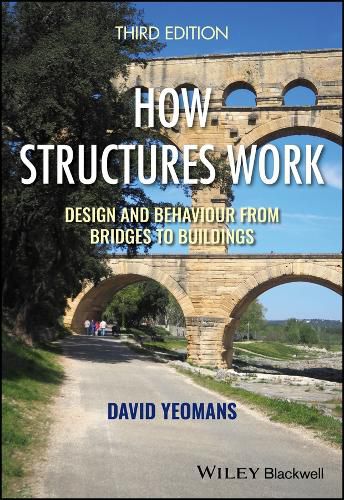Readings Newsletter
Become a Readings Member to make your shopping experience even easier.
Sign in or sign up for free!
You’re not far away from qualifying for FREE standard shipping within Australia
You’ve qualified for FREE standard shipping within Australia
The cart is loading…






HOW STRUCTURES WORK DESIGN AND BEHAVIOUR FROM BRIDGES TO BUILDINGS, THIRD EDITION DAVID YEOMANS
Structural engineering is essential to the design of a building. How the building behaves when subjected to various forces - the weight of the materials used to build it, the weight of the occupants or the traffic it carries, the force of the wind, etc. - is fundamental to its stability. The alliance between architecture and structural engineering is therefore critical to the successful design and completion of the buildings and infrastructure that surrounds us. Yet structure is often cloaked in mathematics which many architects and surveyors find difficult to understand.
How Structures Work has been written to explain the bahaviour of structures in a clear way without resorting to complex mathematics. It is aimed at all who require a good qualitative understanding of structures, their behaviour, and design, and as such will be of benefit to students of architecture, architectural history, building surveying and civil engineering. The straightforward, nonmathematical approach ensures it will also be suitable for a wider audience including building administrators and the interested layman. This new edition includes a new chapter to deal with some little understood structures both ancient and modern.
Reviews of the first edition
"How Structures work is the most compelling on structures that I have ever read. And I have read a lot of books on structures." -R.L.Brungraber, Ph.D., P.E Timber Framing: Journal of the Timber Framers Guild, December 2009
"The author writes beautifully. It is a user-friendly engaging book to read and one that is very easy to understand. One learns a lot by reading it ... I think it should be a compulsory text for all first year engineering students."
From a review of the first edition commissioned by the publisher.
$9.00 standard shipping within Australia
FREE standard shipping within Australia for orders over $100.00
Express & International shipping calculated at checkout
Stock availability can be subject to change without notice. We recommend calling the shop or contacting our online team to check availability of low stock items. Please see our Shopping Online page for more details.
HOW STRUCTURES WORK DESIGN AND BEHAVIOUR FROM BRIDGES TO BUILDINGS, THIRD EDITION DAVID YEOMANS
Structural engineering is essential to the design of a building. How the building behaves when subjected to various forces - the weight of the materials used to build it, the weight of the occupants or the traffic it carries, the force of the wind, etc. - is fundamental to its stability. The alliance between architecture and structural engineering is therefore critical to the successful design and completion of the buildings and infrastructure that surrounds us. Yet structure is often cloaked in mathematics which many architects and surveyors find difficult to understand.
How Structures Work has been written to explain the bahaviour of structures in a clear way without resorting to complex mathematics. It is aimed at all who require a good qualitative understanding of structures, their behaviour, and design, and as such will be of benefit to students of architecture, architectural history, building surveying and civil engineering. The straightforward, nonmathematical approach ensures it will also be suitable for a wider audience including building administrators and the interested layman. This new edition includes a new chapter to deal with some little understood structures both ancient and modern.
Reviews of the first edition
"How Structures work is the most compelling on structures that I have ever read. And I have read a lot of books on structures." -R.L.Brungraber, Ph.D., P.E Timber Framing: Journal of the Timber Framers Guild, December 2009
"The author writes beautifully. It is a user-friendly engaging book to read and one that is very easy to understand. One learns a lot by reading it ... I think it should be a compulsory text for all first year engineering students."
From a review of the first edition commissioned by the publisher.